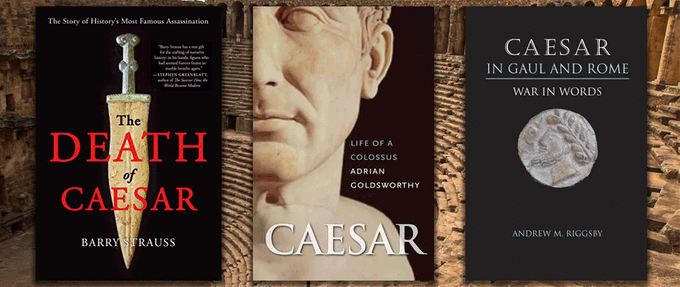Julius Caesar was a powerful Roman general and statesman who conquered Gaul, inspired a civil war, and eventually came to rule over Rome itself before being assassinated in one of history’s most-notorious betrayals. Julius Caesar was a man of great ambition and strategy whose political and military campaigns toppled the Roman Republic and paved the way for the establishment of the Roman Empire. Caesar shaped the Greco-Roman world in an undeniable way, so much so that his name has come to be synonymous with “emperor” across Western cultures, and his remarkable legacy lives on today. There is much to learn about a figure as significant as Julius Caesar, and plenty of ancient source material to be studied. The following titles illuminate each facet of Caesar’s life, military career, and political maneuverings in accessible and well-researched scholarship.
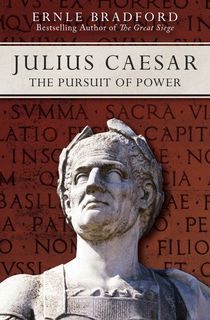
Julius Caesar
One of the most powerful men in history, Julius Caesar is renowned for his military genius, political prowess, and written and oratorical skills. He formed the Roman Republic by combining forces with Pompey and Crassus, but that was only the beginning of Caesar’s quest for power, one that ultimately ended in a fatal betrayal that would change Rome forever. In Julius Caesar, Ernle Bradford reveals how Caesar’s pursuit of power and his push for radical change would shape the fate of the Roman Empire.
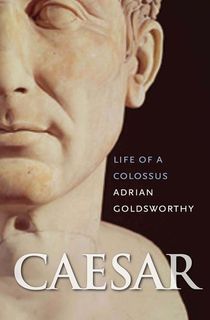
Caesar
In Caesar, Adrian Goldsworthy studies Julius Caesar beyond his reputation as emperor and general and delves into aspects of Caesar’s life that are largely unknown. Caesar was, at times, a cult leader, adulterer, rebel, and an astounding military leader whose legacy remains potent today. A complex character who led many lives before his was cut short, Caesar attempts to survey all of the roles held by Julius Caesar in his lifetime.
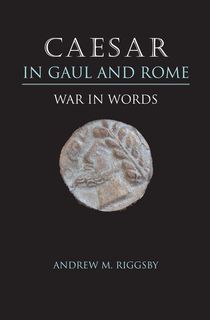
Caesar in Gaul and Rome
Julius Caesar’s skill with language is well-known, but what exactly did he utilize his skills for? Andrew M. Riggsby aims to evaluate Caesar’s significant commentary on campaigns against the Gauls in the 50s BC. Caesar’s writings had the power to influence Roman identity and the political future, and many of his works are studied today as excellent Latin prose. By analyzing the work with contemporary literary methods, Riggsby delivers an impressive examination of Caesar’s power with words, people, and war.
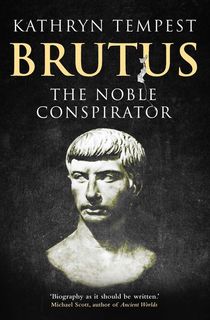
Brutus
A name synonymous with betrayal, Brutus is well known for his role in the assassination of his friend and leader, Julius Caesar. But was he wrong to do what he did? In Brutus: The Noble Conspirator, Kathryn Tempest studies contemporary sources and authentic correspondence that illuminates the personal and political conflicts Marcus Brutus faced, and ultimately reveals just what motivated him to commit a murder that changed history.
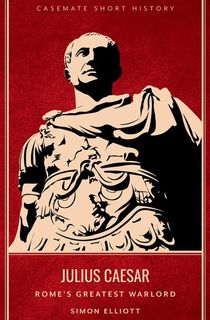
Julius Caesar
In this concise history of Julius Caesar’s military career, Simon Elliott studies the campaigns that shaped Caesar’s reputation. From the time he was a young man, born into aristocracy, Caesar campaigned in the east, Spain, and in early Roman civil wars. By the time he wrote and published his commentary on the Gallic Wars, there were years of military conquests defining Caesar’s reign. Julius Caesar: Rome’s Greatest Warlord is the ultimate guide to the long and complicated history of military might left in Caesar’s wake.
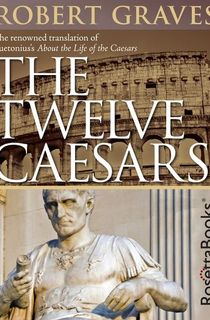
The Twelve Caesars
A rare and essential read on Julius Caesar and Roman history, The Twelve Caesars is a primary source written by Suetonius, private secretary to the Emperor Hadrian. Using the imperial archives and eyewitness accounts, Suetonius produced a biography illustrating the private lives and careers of the most powerful men in Rome. The Twelve Caesars chronicles the building of the Roman Empire under Julius Caesar and Augustus and the expansions, failures, and successes that befell the Empire in the years after. This edition is expertly translated by the author of I, Claudius and Goodbye to All That.
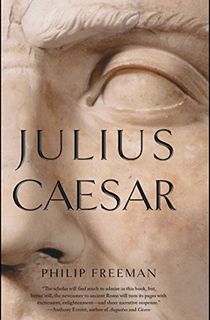
Julius Caesar
Perfect for novice researchers and seasoned historians of Rome alike, Julius Caesar is a captivating review of Caesar’s life, reign, and military career. Including anecdotes of important figures such as Cicero, Mark Antony, Octavius, and Cleopatra, this study of Caesar’s life illustrates the fascinating aspects of this chapter of history. Philip Freeman presents the facts of Caesar’s life against imperative historical context in a captivating biography of the man whose name has long been associated with rulers of great power.
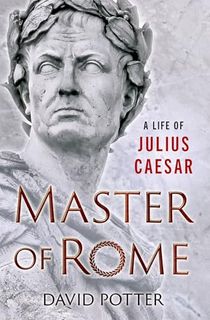
Master of Rome
Julius Caesar proclaimed himself a “popular” politician who believed an effective government would better the lives of the Roman people, but not through democracy. Caesar believed the only way to effectively run the empire was through his personal management and the movement he built to overthrow the existing Roman government. Through primary sources and Caesar’s own writings, David Stone Potter delivers a comprehensive view of Julius Caesar as a strategic politician and statesman in Master of Rome.
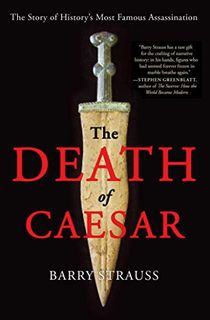
The Death of Caesar: The Story of History's Most Famous Assassination
The stabbing of Julius Caesar on the Ides of March is perhaps history’s most well-known assassination. As Barry Strauss explores in The Death of Caesar, Caesar’s death marked the end of one civil war and led to the start of another. A death that was political in nature, Julius Caesar’s demise would bring about the fall of the Roman Republic and the development of the Roman Empire. The intrigue, diplomacy, and political motives behind his assassination are told in captivating storytelling by Strauss and are supplemented by a detailed account of the events that transpired after Caesar’s death.
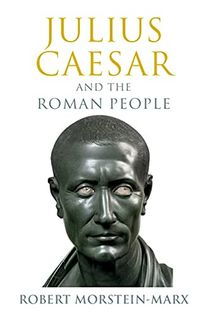
Julius Caesar and the Roman People
Though often labeled as dictator and blamed for the fall of the Roman Republic, Julius Caesar was not an autocrat, and his policies did not topple the structures of the Republic. In Julius Caesar and the Roman People, Robert Morstein-Marx explains how it was Caesar’s success as a leader that pushed his opposition to cultivate a civil war rather than accept political defeat. This book offers a reinterpretation of a pivotal time in Roman history based on reevaluation of ancient sources and a new understanding of the role of the Roman people in governance.
Featured image: Mick Haupt / Unsplash
